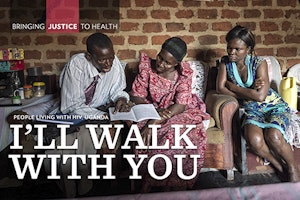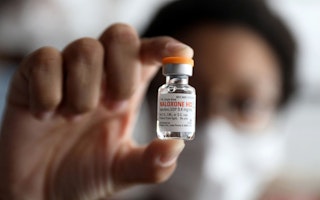End AIDS by 2030? Not at This Rate
By Ralf Jürgens
The big buzz at this year’s International AIDS Conference is that we can end AIDS by 2030. But I have to come out and say it: If the global response looks like it does today, we’re not going to make it.
Sure, we have reason for hope. We are reaching more people than ever who are willing and able to access HIV services. Many countries are seeing infection rates drop and more people receiving treatment. We know we have the science to end the epidemic.
So, what is standing in the way of victory by 2030?
There is a consensus that—in addition to basic HIV programs like testing, circumcision, condoms, sterile needles, and methadone treatment—we need activities that support people with HIV to take up, and stick with, basic HIV programs.
Human rights programs do just that. According to UNAIDS, they should be part of every country’s response to HIV.
To safeguard the human rights of people living with HIV, we need:
- programs to reduce stigma and discrimination;
- HIV-related legal services;
- efforts to monitor and reform bad laws, regulations, and policies that inhibit the fight against HIV;
- law enforcement sensitization to the concerns of criminalized and socially excluded populations;
- programs to reduce discrimination, violence, harmful gender norms and laws experienced by women.
Yet funding for these programs and the organizations that run them is decreasing.
Less than one percent of the $18.9 billion spent on the overall HIV response in 2012 went toward the human rights response to HIV.
Many of the rights organizations that have made progress possible in the fight against HIV are closing down or downsizing because they find it increasingly difficult to access funds for their work. These are the organizations that hold their governments accountable, take pharmaceutical companies to court, or create social movements that demand real change.
Given this, what do we need to end AIDS by 2030?
First, we need donors and governments to fully fund all critical components of the HIV response. This includes dedicated funds for the human rights programs that are key to its success.
Second, we need the Global Fund to Fight AIDS, Tuberculosis and Malaria to work with governments and civil society to realize the human rights component of its strategy. The Global Fund must stop adopting policies and practices that risk undermining human rights, such as the rapid withdrawal of funding from many middle-income countries, or proposals to introduce tiered pricing for vital medicines.
Third, we need UNAIDS to work hard with all partners to ensure that human rights programs are fully integrated into country’s national AIDS responses.
And fourth, we need to expand existing donor collaborations between HIV donors and human rights donors in order to ensure a greater funding base for this work.
Without these changes the 2030 goal will only be empty talk. And we will continue to leave millions of people behind.
Until May 2015, Ralf Jürgens was director of programs of the Open Society Public Health Program.

